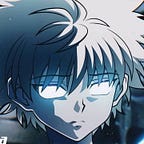Look.
I didn’t expect to be here. I seriously didn’t.
Genshin Impact was supposed to be another time-sink, a mindless 50 hour grind game with a shitty story and fun combat system that sadly deteriorated rapidly as you progressed through the game. It was supposed to be just another gacha game, another Chinese ripoff of a beloved game series.
While I’ll leave the comparisons and the legal complications to the lawyers and the game reviewers, there is one thing I can do, and that’s overanalyze the game to the point where I am unsure of my own existence.
So let’s take a philosophical deep dive into a game that makes you spend hundreds of dollars for a single jpeg, and take a look at the story of Genshin Impact, and what we can learn from it.
— — — — — — — — — — —
Your name in single player games is one of the most important aspects of the character you play. When there is already a set name for the character you play as, like “Link”, or “Mario,” that means that character has already been established. Instead of being a blank slate, they are a character with feelings and emotions that are unrelated to the character’s decisions. These are the types of games that usually don’t require dialogue choices.
Now if it means you get to choose your character’s name, that would mean that you are a blank slate. Whether it means you are someone who has forgotten his past, now you can craft a new life for yourself, because the past either doesn’t matter, or doesn’t exist.
There are several exceptions to this rule, but they all fall under the category of you learning as your character learns. As he/she sees his past, so do you, and so it’s more akin to watching a movie of someone else’s life.
Genshin Impact doesn’t do any of that. You’re able to choose your name, but there’s a feeling that there’s a lot that your chosen character keeps from you. How were you traveling from world to world? Why were you blocked? What were you trying to do? Not only that, but the fact that other people only refer to you as traveler, and your own sibling referring to you as either “Lumine” or “Aether,” the “canonically-correct” names of your character, there’s a sense of futility in your actions. You don’t get to choose your name.
You get to choose your name, and yet the protagonist has a mind of their own. The game actively tells you that you have choices, and yet those choices don’t matter. It all goes into one plotpoint in the end, and it doesn’t change our protagonist. They are still Lumine and Aether, untainted by the player’s desires.
It all works together to create an air of mystery in creating an unreliable narrator. Sure, we are in control of our character, but we don’t know what he or she thinks, instead we only see things from a third person limited perspective. It’s an interesting take that while isn’t the first of its time, still holds up as a unique personalization of the idea of perspective in video games.
— — — — — —
For me, the story of Genshin Impact really starts picking up in the prelude to the 4th act of the first chapter. Up until now, the Genshin community has been exposed to and loved each variation of former archons who have changed into regular mortal forms in order to enjoy life, but as the quest goes forward, a much darker image of them starts rearing their head. Venti and Zhongli are both fan favorites characters in the Genshin community, each with their own quirks and personalities, but as we further explore into the secrets of the Abyss, we start to realize that there is a lot more to them than just these funny and smart people.
You start to connect the dots. 500 years ago, the nation of Khaenri’ah was destroyed, innocent civilians squashed. 500 years ago, seven gods rose to power to rule over seven regions. The protagonist’s sibling was separated from them by an unknown god. The Abyss Mages were born from the ashes of Khaenri’ah.
It makes sense now, why your sibling is on the side of the abyss. You were separated 500 years ago, she was sent to the destruction of Khaenri’ah, you to 500 years in the future. She saw the horrors that faced her, and in doing so, tried to enact revenge on the gods who had caused that much suffering.
So the entire story takes a full 180 on itself. Just a while ago you were joking with Venti and Zhongli, calling Zhongli broke and Venti a tone deaf bard. They were perfectly normal people with normal aspirations, and yet, after learning about the horrors of a fallen city, a city whom those two people were directly responsible for the destruction of, the conversation turns into a dark discussion of power.
Genshin Impact’s full 180 on itself has me convinced that the writers of the lore are either geniuses or lazy. You don’t get this kind of story anywhere very often, but I also might be reading too much for a game design for an online gacha game. I might be a tinfoil hat Alex Jones conspiracy nut, but honestly, most of the fun in this game is trying to interpret what the writers are trying to say.
Learning visual storytelling has always been a difficulty for me. Because I don’t really have access to online classes, I’ve always learned by example, and Genshin Impact, whether intentional or not, is a great learning opportunity for me. It’s a lesson in perspective as well as subverting expectations, and seriously doesn’t deserve the shit it gets for being an anime gacha game.
Then again, I’m just overanalyzing again.
Thanks for reading!
